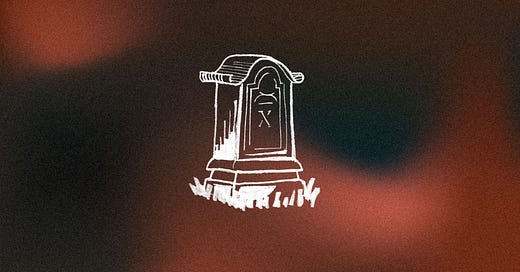Part 4 of our series with David Benjamin Blower: Notes on Poverty, Death and Nothingness, exploring the writings of St Paul of the Cross
“Continue to repose on the cross until the happy moment of your mystical death. This precious death is more desirable than life…”
St Paul of the Cross wrote this to somebody. I don’t know who they were, or whether they were pleased to read it.
Paul wrote often about what he called “the mystical death.” Mystical things are hazardous to name and talk about. They are experiences, rather than ideas, and so it becomes difficult to know certain things. Can that person’s experience be shared by another? Should it be? How would I know that I had really experienced what they had experienced, and not something else? Do I need to experience it? Is there a hierarchy of experiences?
I mostly hope not. I don't want to think about these sorts of things in those sorts of ways. All that said, the language of mystical death opens another dimension to the contemplations of St Paul. Here he goes from seeing the Messiah on the cross, to seeing himself on the cross. From contemplating the Messiah's death, to embracing his own, in response.
In the sense that the unwashed dishes really don't matter very much at the threshold of mortality, the mystical death of St Paul is characterized by a kind of blissful freedom that comes from letting go.
There’s a good old religious archetype here. People call it ego death—a personal experience of freedom and peace that comes from finally letting go of the knotted inner conflicts that our self-interests tend to produce. It is mentally, emotionally and physically tiring, trying to defend ourselves in a world that feels unsafe. So there is a kind of bliss, or relief, in the act of letting go. And of course this is mystical: it's a paradox. Peace only comes when we stop striving for it.
There's also a social and political dimension to the idea of mystical death. In St Paul of the Cross this is to be found in rather ascetic sounding language. It is to be “entirely despoiled of every created thing… and to dissipate, in the abyss of the Divinity, all those little distractions that annoy you.”
This perhaps sounds more anti-social than social, but there is a sense in which love begins where competition and obligation ends. At the gates of mortality, the social and political claims that the world makes over us—the tiresome web of obligations—these all stop mattering. We can act in the world freely towards the other when we are no longer driven or bound by its power structures. Who can threaten the one who has already died?
As the other St Paul said, the one who has died is freed from the law; freed from a life of obligation or self preservation; free to make the authentic, and often costly choice to love. There's a frightening liberty that comes from raising the jolly roger, as it were. Alongside its deep compassion, the mystical death leans into a trickster-ish indifference to the present age. The person who has died can freely and cheerfully confront the world.
For St Paul, though, ultimately, the meaning of what he calls the mystical death is to fall into an experience, into a depth of relationship with God. “He who is mystically dead seeks only God… He casts away all other thoughts, however good, in order to think only of God.” He goes on to speak in the tenor of the mystics:
“For God alone dwells in this secret place, which is the essence, the spirit, the sanctuary of the soul, where the heavenly hosts themselves are attentive to this divine operation, to this divine birth, which takes place every moment for the one who is so happy as to be mystically dead on the cross.”
And so in the end, this death, this letting go, is for St Paul of the Cross, a rebirth. It is a door back into a free relationship with oneself, a free relationship with the world, and back into a free relationship with the Creator.
Read our print edition, PASSIO Magazine, from our shop
Just head over to our shop to pick up our range of PASSIO Magazine issues — this print edition is strictly limited, so we’ve only a handful of back-issues left!









